|
|
|
Sort Order |
|
|
|
Items / Page
|
|
|
|
|
|
|
| Srl | Item |
| 1 |
ID:
187026
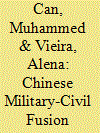

|
|
|
|
|
| Summary/Abstract |
An analysis of the Chinese military-civil fusion strategy through a neoclassical realist and state action theory perspective highlights that the advent of emerging technologies has opened up an unprecedented opportunity for states to amplify the extraction and mobilisation of resources, conducive to maintaining and increasing their military and economic power in global politics. Underpinned by increasing cooperation between the People’s Liberation Army and private companies as well as state-owned enterprises, the Chinese military-civil fusion strategy can be viewed as a comprehensive strategy of mobilisation and extraction (actively relying on state-driven technology advancement) that has especially drawn upon technology transfer and talent recruitment from abroad. In this regard, China has acted in line with the premises of state action theory.
|
|
|
|
|
|
|
|
|
|
|
|
|
|
|
|
| 2 |
ID:
174600
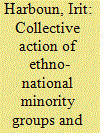

|
|
|
|
|
| Summary/Abstract |
Collective action requires resources, organization, leaders and political opportunities. In the case of disadvantaged minority groups, long-standing conflict with the majority, a closed political opportunity structure and the difficulty of acquiring resources, increases the costs and risks of the action. We argue that the development of such an action is a function of leaders’ perceptions about the cost of inaction (COI) and symbolic resources of the group, such as solidarity. Combining these evaluations creates three trajectories: growth, restriction and decline. We examine this argument by four collective actions carried out by Arab Palestinians citizens in Israel to improve education. The findings show that leaders increased efforts even if they assessed opportunities are limited when they thought that COI is high, since inaction means not only the loss of instrumental costs but also the loss of potential symbolic gains such as recognition of the group collective identity.
|
|
|
|
|
|
|
|
|
|
|
|
|
|
|
|
| 3 |
ID:
114013
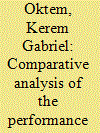

|
|
|
|
|
| Publication |
2012.
|
| Summary/Abstract |
This article compares the fortunes of the government coalitions under the leadership of the Communist Party of India (Marxist) or CPI(M) in Kerala, West Bengal and Tripura. The pattern of development and the success of the coalitions differ. In Kerala, the Left has lost every other election, whereas in West Bengal and Tripura, it has won many consecutive elections. West Bengal has seen stagnation in terms of human development, whereas Kerala and Tripura turned-to different degrees-into model states for human development. It is argued that the reasons for these different paths are to be found in the different strategies followed by the regional party units. Developmental success has been delivered through a mobilisation-based approach which has been followed inKerala and Tripura, but given up in West Bengal. This study explores thethree cases and elaborates on the reasons for the choice of strategies in the three states.
|
|
|
|
|
|
|
|
|
|
|
|
|
|
|
|
| 4 |
ID:
123563
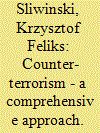

|
|
|
|
|
| Publication |
2013.
|
| Summary/Abstract |
The global war on terror and 9/11 have brought to our attention the perpetual problem of freedom versus security. The more governments strive to provide security, the more they tend to curb the freedoms of their citizens. 'Stop and search' procedures, 28-day detentions of terrorist suspects without charge or new body scanners at the airports are just the 'tip of the iceberg' in a long list of the state's encroachments into our private lives. This paper departs from such a seemingly inescapable predicament. It analyses the role of the public in preventing, protecting and preparing for terrorist attacks under the British government's counter-terrorism strategy known as CONTEST. It explores two social phenomena that are being increasingly promoted by official authorities in the United Kingdom, namely, mobilisation of society and what the author terms 'civilianisation' of security. The latter is defined as a notion relating to non-military, voluntary organisations and the business/private sector, engaged by government but acting in its own right against terrorism threats. 'Civilianisation' of security is also conceived of as a potential tool to bridge the gap between two incompatible worlds of state security and personal freedoms.
|
|
|
|
|
|
|
|
|
|
|
|
|
|
|
|
| 5 |
ID:
172158
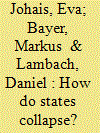

|
|
|
|
|
| Summary/Abstract |
State collapse is a highly consequential event. But we know very little about the reasons why and how states lose their capacities of violence control, rule-making and taxation. In order to explore the underlying causal mechanisms, we use a nested analysis combining Qualitative Comparative Analysis and comparative process-tracing. While the mobilisation of armed opposition groups is a necessary condition for state collapse, it only works in concurrence with other conditions, namely political transitions, repression, factionalism, intra-elite rivalry and external interventions. Thus, the article presents a causal model that shows the alternative pathways leading to state collapse.
|
|
|
|
|
|
|
|
|
|
|
|
|
|
|
|
| 6 |
ID:
147189
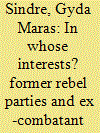

|
|
|
|
|
| Summary/Abstract |
An important factor shaping rebel-to-party transformations and post-conflict party governance pertains to how these groups relate to their former rank and file. While drawing on veterans of the war provides for stable source of support and organisational stability for the former rebel parties, ex-combatants may also pose challenges to such parties as they expect continued political influence, material rewards and social recognition for their contribution to the armed group. By identifying ex-combatants as a distinct interest group this argues that party-ex-combatant interaction directly shapes intra-party dynamics as well as policy formulation. Focusing on former rebel parties and ex-combatant interest group mobilisation in Aceh and East Timor, and this articles asks: How does rebel group mobilisation affect how former rebel parties mobilise political support? How do parties address and integrate demands made by ex-combatants?
|
|
|
|
|
|
|
|
|
|
|
|
|
|
|
|
| 7 |
ID:
166428
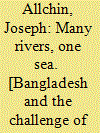

|
|
|
|
|
| Publication |
London, C. Hurst and Company, 2019.
|
| Description |
vii, 237p.: mappbk
|
| Standard Number |
9781849048743
|
|
|
|
|
|
|
|
|
|
|
|
Copies: C:1/I:0,R:0,Q:0
Circulation
| Accession# | Call# | Current Location | Status | Policy | Location |
| 059680 | 950.05/ALL 059680 | Main | On Shelf | General | |
|
|
|
|
| 8 |
ID:
184079
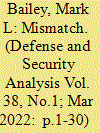

|
|
|
|
|
| Summary/Abstract |
Large-scale illegal fishing commenced in Australian coastal reefs 1970. Since, the Royal Australian Navy (RAN) has been “out of synch” with matching its Tier 2 constabulary vessels to their mission. The pattern is that “mission goalposts” shift post-acquisition, reflecting changes to UNCLOS. Post-WWII, the RAN employed wartime escorts in patrol roles, and wartime launches for littoral constabulary. The RAN has recreated this mix in the twentyfirst century. This paper traces this process and associated problems. Minimum resources are assigned to constabulary functions in peacetime, yet the units involved are arguably the most operational and politically sensitive. Vessel unsuitability has consistently meant personnel problems, over-use of constabulary vessels, and high maintenance costs. Australia's strategic situation is deteriorating towards a point where the rising risk demands mobilisation responses. This would include rapid acquisition of large numbers of Tier 2 assets to meet existing and conflict low-mix roles.
|
|
|
|
|
|
|
|
|
|
|
|
|
|
|
|
| 9 |
ID:
127850
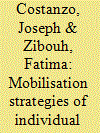

|
|
|
|
|
| Publication |
2014.
|
| Summary/Abstract |
Though sharing a common territory, the cultural spaces of Brussels are divided according to a complex structure where Francophone and Flemish Communities play a dominant role. These two language-based communities set separate cultural policies and programming for their residents in Brussels. Within this fragmented structure, local socio-cultural actors have mobilised promoting cross-Community collaboration towards a shared vision for the Brussels-Capital Region (ex. Cultural Plan for Brussels). Further, individual artists themselves have developed strategies to participate in Community-defined cultural programming and to gain recognition for their talent as local (Bruxellois) artists regardless of their ethnic, linguistic or migrant background. This article explores how socio-cultural actors and artists have mobilised to reframe 'culture' in Brussels, and to gain access to cultural venues particularly in the case of migrant and migrant-origin artists whose engagement and recognition in Brussels' cultural scenes have been little studied.
|
|
|
|
|
|
|
|
|
|
|
|
|
|
|
|
| 10 |
ID:
104104
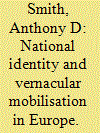

|
|
|
| 11 |
ID:
145466
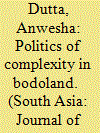

|
|
|
|
|
| Summary/Abstract |
The 2014 Lok Sabha elections witnessed a significant shift in the political spectrum of the Bodo Territorial Autonomous District (BTAD) in Assam, with non-Bodos voting en masse for an independent candidate, a former United Liberation Front of Assam (ULFA) militant who was backed by a collective of non-Bodo organisations. Using the elections as a focal point, this paper aims to explore the larger political dynamics, political mobilisation and shifting alliances within a framework of contentious politics and collective action that unfurled during the elections and eventually led to an episode of targeted violence against the Muslim community in BTAD.
|
|
|
|
|
|
|
|
|
|
|
|
|
|
|
|
| 12 |
ID:
145462
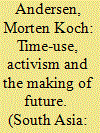

|
|
|
|
|
| Summary/Abstract |
The tendency of young men to join violent political organisations is a pertinent issue in the global arena of the social sciences and international policy, with studies of youth mobilisation and violence tending to focus on young marginalised men. This article proposes another view of political mobilisation, youths and violence that takes as its point of departure the centre of political power, namely the emerging elite in Bangladesh and young men engaged in youth politics at Dhaka University. Based on an analysis of mobilisation as processes of individual risk manoeuvring, relational aspirations and organisational incorporation, it argues time and time-use are productive analytical lenses to contextualise individual processes of involvement and bring out the agency of mobilisation.
|
|
|
|
|
|
|
|
|
|
|
|
|
|
|
|
| 13 |
ID:
107043
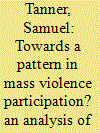

|
|
|
|
|
| Publication |
2011.
|
| Summary/Abstract |
In this article, I focus on the logic whereby a group of eight Hutu became involved in mass violence during the 1994 Rwandan genocide. This process is considered as a sequence of meaningful events that progressively shaped the actors' frame of analysis. As such, each sequence brings a new qualitative reality which, in turn, constitutes the platform upon which the involvement in, and the perpetration of, mass violence become acceptable and legitimate in the eyes of the perpetrators. Based on both Howard S. Becker's notion of career and Roger Petersen's analysis of resistance and rebellion, I disaggregate the entire process of participation in mass violence into a sequence of six mechanisms, generating two main phases. The first one, mobilisation, refers to the movement from a neutral state to a mobilised state. The second phase, collective action, covers the drift from mobilisation to action, namely, killings.
|
|
|
|
|
|
|
|
|
|
|
|
|
|
|
|
| 14 |
ID:
109025
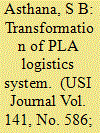

|
|
|
| 15 |
ID:
192296
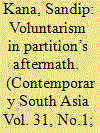

|
|
|
|
|
| Summary/Abstract |
This article adopts an alternative framework for thinking about the Nehruvian state and the drivers that shaped India’s postcolonial development strategy. This is a firm shift away from viewing development as a technocratic enterprise, and towards a focus on how the Nehruvian state sought to deploy notions of voluntarism. Within the Indian context, voluntarism referred to the mobilisation of ordinary people to further local development projects. This article investigates voluntarism through efforts at rehabilitating able-bodied refugees in Faridabad. Like many refugee townships that were constructed in the immediate aftermath of Partition, Faridabad was built from the ground up entirely through reskilled able-bodied refugee labour. Within the environment of rehabilitation, the article shows how voluntarism through the cooperative model became an integral postcolonial development strategy adopted by the Nehruvian state to construct new distinct urban spaces on formerly uncultivated lands. However, the article will reveal how the Nehruvian state’s use of voluntarism was beset with tensions, challenges, and problems. The article shows how widespread refugee discontent, bureaucratic mismanagement and alleged financial misconduct ultimately impeded the Nehruvian vision of empowering and mobilising ordinary Indians to further projects of public utility.
|
|
|
|
|
|
|
|
|
|
|
|
|
|
|
|
| 16 |
ID:
112416
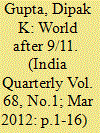

|
|
|
|
|
| Publication |
2012.
|
| Summary/Abstract |
A decade has passed since the attacks of 9/11. The heightened curiosity about terrorism has seen an avalanche of books and articles in recent years. In this article, after tracing the evolution of research in the area of social conflict, in general, and terrorism, in particular, I attempt to understand if the collected wisdom has altered the views of those who make public policies in the US. However, in a rapidly changing world, some of the old theories of mass mobilisation are becoming obsolete with equal speed. At a time when ideas can spread across the world in the speed of light through the Internet, we may have to have a different methodology for understanding how political movements are formed and how the government can mitigate the risks of politically motivated violence.
|
|
|
|
|
|
|
|
|
|
|
|
|
|
|
|
| 17 |
ID:
160356
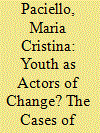

|
|
|
|
|
| Summary/Abstract |
In the last decades, ‘youth’ has increasingly become a fashionable category in academic and development literature and a key development (or security) priority. However, beyond its biological attributes, youth is a socially constructed category and also one that tends to be featured in times of drastic social change. As the history of the category shows in both Morocco and Tunisia, youth can represent the wished-for model of future citizenry and a symbol of renovation, or its ‘not-yet-adult’ status which still requires guidance and protection can be used as a justification for increased social control and repression of broader social mobilisation. Furthermore, when used as a homogeneous and undifferentiated category, the reference to youth can divert attention away from other social divides such as class in highly unequal societies.
|
|
|
|
|
|
|
|
|
|
|
|
|
|
|
|
|
|
|
|
|